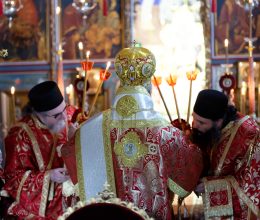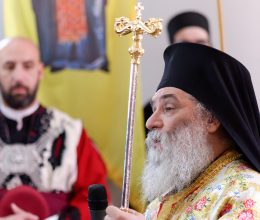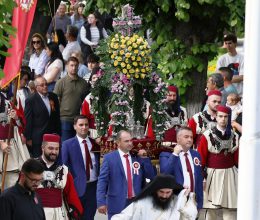Sermon of His Eminence, Bishop Parthenius of Antania, Elder and Abbot of the Holy Bigorski Monastery, delivered after the reading of the Gospel of the Holy Liturgy, on the Feast of the Holy and Great Megalomartyr Saint George the Triumphant, in the Monastery of Rajcica, on the 6th of May 2021.
Christ is Risen!
In the name of the Father, the Son and the Holy Spirit!
Today, my dear ones, is already the fifth day of the Bright Week, the fifth day after the greatest feast in the Church, the Resurrection of Christ. Today’s reading of the Gospel at the Holy Liturgy, of this day, referred to the Jewish noble Nicodemus, who secretly went to Christ one night, in order to speak with Him. We assume that he went to Him at night, maybe because, he was afraid or ashamed of other Pharisees and rulers to see him meeting with Christ, who was despised and hated by the Jewish nobles and teachers of the Law. Or perhaps, he did not want to talk to Christ in the midst of the multitude, but alone, so that he could be able to ask Him questions and listen to His answers, in order to get a clear view on some topics he was thinking about. This Jewish noble, differed from the rest of the rulers in that he had a sense and insight into the deeds and miracles that the Lord Jesus performed, and for the teachings that came out of his Divine mouth. He had, therefore, a good and God-accepting heart, and therefore, with his spiritual eyes he recognized that Christ is more than an ordinary man. That’s why when talking to Jesus he said: Rabbi, we know that thou art a teacher come from God: for no man can do these miracles that thou doest, except God be with him (John 3,2). This is, indeed, a great enlightenment for a Jewish prince, knowing that many other were terribly against Christ and asserted that the miracles He performed were by the power of the wicked (Cf. Mark 3, 22).

The discussion between Christ and Nicodemus, described in the Gospel of St John the Theologian, is particularly deep and amazingly theological. The Savior, among other things, says to His conversational partner: Verily, verily, I say unto thee, except a man be born again, he cannot see the kingdom of God (John 3,3). Nicodemus was astonished by this statement. As he was in an advanced age, he asked Christ: How can a man be born when is old? Can he enter his mother’s womb for a second time and be born again? To this Christ answered: Verily, verily, I say unto thee, except a man be born of water and of the Spirit, he cannot enter into the kingdom of God. That which is born of the flesh is flesh; and that which is born of the Spirit is spirit (John 3, 3-6). The Lord Christ there thinks and speaks about the spiritual rebirth that will take place through His Resurrection and Ascension, for all those who will receive the Holy Baptism and accept to bear their cross. At the act of the baptism there is one prayer concerning the newly baptized: “Renew him in an eternal life, and fill him with the power of thy Holy Spirit, to be united with thy Christ, so that he may no longer be a child of the flesh, but a child of thy kingdom”. Through the Sacrament of Baptism each Christian becomes a new creation, a child of the Spirit. For Nicodemus and all scribes of that time, who outwardly knew well the Holy Scriptures, perhaps even by heart, it was difficult to understand these words, because they became worshipers of the letter and the form. That is why Christ says to him: If I have told you earthly tings, and ye believe not, how shall ye believe, if I tell you of heavenly things? (John 3,12). The theology of Christ was not an earthly wisdom, but a living revelation of the heavenly mysteries, a way of living according to the Spirit.
The second important segment of Christ’s instructive conversation with Nicodemus is the theology of the Holy Spirit: The wind bloweth where it listeth, and thou hearest the sound thereof, but canst not tell whence it cometh, and wither it goeth: so is every one that is born of the Spirit (John 3,8). He means that the Spirit of God seeks humble hearts open to receive Him, hearts like the simple Galilean fishermen. From simple and uneducated individuals, through the Holy Spirit, they became conquerors of the whole Universe. Unlike those who superficially read and interpreted the Holy Scriptures, without understanding them with their heart and fulfilling implementing them in their lives. Thus, my dear ones, in order to be a true theologian, it is necessary to have an open and pure heart, filled with gratitude and love for God. The Holy Spirit breathes into such hearts and enlightens them with the greatest salvation mysteries. Saint Ignatius Bryanchaninov says in one of his teaching: “A doctor of theology may be the best in his field, accredited by academics, but if such an unfortunate situation were to happen in his life, he would begin to doubt with uncertainty: Does God really exist? So, can light come out of darkness?” Thus, the righteous theologian and Christian, must never doubt God and His Providence. For everyone born of “water and spirit”, doubt is inadmissible, because he being dead for this world and the evil in it, should be a witness of the Light.
The third important moment in the conversation of Christ with Nicodemus is the prophecy that our Lord gives about Himself. Namely, He is making comparison with an example from the Old Testament, when Moses, as commended by God, made a copper snake, and lifted it up just like we elevate the crosses during the litanies, so that anyone who was bitten by a snake in the desert would be healed if he looked upon the copper snake with faith. And no man hath ascended up to heaven, but he that came down from heaven, even the Son of man which is in heaven. And as Moses lifted up the serpent in the wilderness, even so must the Son of man be lifted up. That whosoever believeth in him should not perish, but have eternal life (John 3, 13-15). The lifting up in the heavens represents the Ascension of our Saviour, when He elevated the human nature to the Divine Kingdom, and thus completed the salvation of the world and gave us the opportunity for deification. The elevation of the Son of Man represents His crucifixion, and everyone who looks with faith on the Resurrected One would not perish, but would attain life eternal. How incomprehensible for us is the Divine Love! God, Himself, accepts to be elevated and nailed to the cross for our salvation.
This year the fifth day of the Bright Week, coincides with the celebration of the Great Megalomartyr St. George the Triumphant, therefore beside the regular Gospel we have also read the Gospel for Martyrs. This Gospel begins with love. Namely, our Lord Jesus Christ tells His disciples: I command you, that ye love one another (John 15, 17), and ends with the words of Christ: yea, the time cometh, that whosoever killeth you will think that he doeth God service (John 16, 2). So, it begins with God’s commandment for love, and ends with the evil which opposes God. The message is clear: in this world there is a constant battle between good and evil, between love and hate, and as Dostoevsky claims, the battlefield is the human heart. Consequently, it is necessary to always keep evil away from us, through kindness and love. Because evil has no such power as the love has. Because of that, Christ begins today’s Gospel with a commandment of love for one another. Apostle Paul also confirms this in his Epistle to the Galatians: Bear ye one another’s burdens, and so fulfil the law of Christ (Gal 6, 2). These New Testament quotes show us how important love, and patience along with love is, if we want to fulfill God’s Commandments and attain salvation. As Christians, we are obliged to always carry the burden of one another and in this way to make sure that love conquers over evil, which will completely be destroyed at the Second Coming and the Judgment Day.
And the light shineth in darkness; and the darkness comprehended it not” (John 1,5), says the greatest among the theologists, the Evangelist St. John. Evil cannot hold up against the true Christian love, which is the light. St. George chose the light of Christ and rose against the evil of this world, with the love which emanates from God. Because of that, all the evil of this world turned against him, and even executed him. But if you die for Christ, you live with Him forever. St. George died in this world, but he lives in the Eternal Kingdom of God, from where he constantly helps us. According to the words of God: For whosoever will save his life shall lose it: and whosoever will lose his life for my sake shall find it (Matthew 16,25). This refers to all the things in this world which we often love in the wrong way, and get too attached to them, giving in to the different passions and lusts within us, by striving to please ourselves, instead of pleasing God and preserving our soul pure for God’s sake. And whoever loses his soul for this world, and for the corruptive things in it, by restraining himself for the sake of the Gospel and Christ, to the point of even sacrificing his life, he will be saved. This is what St. George did in his time, turning his face away from everything in this perishable world: from his youth and physical strength and beauty, from his rank as a roman tribune; from the salary and honours given by the most powerful individual of that time – the Roman Emperor; from the huge flattering and promises for even greater privileges on Earth offered by King Diocletian, if he only renounced Christ. He left all that behind, lost his soul for this world, and bravely testified the Resurrection of Christ. With his own blood of martyrdom he confessed, that the One, Who climbed on the Cross, is the Only One, Who could elevate us to life eternal, to the Heavenly Kingdom. St. George chose to be elevated to that incorruptible Kingdom, instead of accepting all the attractive offers by the ruler of this world. That is why he is so powerful, and to the present day his spirit is among us, helping us with his miracles, helping all the Christians around the world. In fact, the one who for the sake of Christ renounced all the honours of the Roman Emperor, has been chosen by many states in the world today to be their protector. There have been more than 1700 years since his glorious death, but his fame does not fade at all, because it is eternal. Supported by Christ, he has the freedom to help us every time we call him or pray to him.
My dear ones, the Gospel of the Holy Martyrs teaches us that life in general is martyrdom. Just look at yourselves and all around you: all the people in this world suffer in a way. Still there is a great difference between those who suffer, complaining against God, and those who carry their cross with gratitude. Just think for a moment of the Golgotha event with the three crosses. There were two villains crucified along with Christ. Both suffered equally, but the villain on the right side rebuked the one to the left for his blasphemy: Dost not thou fear God, seeing thou art in the same condemnation? And we indeed justly; for we receive the due reward of our deeds: but this man hath done nothing amiss. And he said unto Jesus, Lord, remember me when thou comest into thy kingdom. And Jesus said unto him, Verily I say unto thee, To day shalt thou be with me in paradise (Luke 23, 40-43). His reasonability, humbleness, and the patience that he had, made him the first citizen of Paradise. The other villain suffered just as much, but although his life was coming to an end, he did not humble himself. On the contrary, he ungratefully grumbled and blasphemed against Christ. Thus, his suffering was beneficial, neither to him, nor to the others, and did not bring him to the Heavenly Kingdom.

Being Christians Let us always have in mind this final example from the earthly life of our Lord Jesus Christ. Because I have noticed that we often do nothing but grumble in our sufferings. I will give you an example with the insignificant everyday family situations, as to how hard it is, for the married ones to humble themselves before their spouses. Sometimes one of them will fall asleep sooner than the other, and this one will start doing something – making noise or talking. Then the first one will get upset, and even get angry and say: “Stop bothering me, if you do not want to come to bed, at least be quiet, I want to sleep!” Or in the morning one of them will wake-up earlier, and the other one will object: “I want to sleep some more, leave me alone, stop it!”. The one who would choose not to grumble, but rather humble himself, would contribute a great deal for the peaceful atmosphere at home, and as a reward would be filled with peace. In those situations, it is better to restrain yourself from words. That way you will bring peace to the other one and will inspire his love. I have given you the simplest example, which I think happens to everyone in their everyday life, and how much we grudge. But there are people with much greater suffering in life, and yet they do not grumble. On the contrary they accept with love and gratitude everything that comes from God, and in this way save themselves and the people around them. Yesterday, I had a conversation with a spiritual child of mine, who told me just how important life moral she had been given in her previous working place. Namely, she worked in a hospital, taking care of children with cerebral paralysis. Indeed, it requires a great effort to take care of such children. Once this woman grumbled in front of the children, saying that she cannot do it anymore, her work is too difficult etc. Then one of the sick children told her: “I cannot go out and play soccer with other children, in fact I can not do anything, and yet I do not complain. you are paid to do this and all you do is just complain about it?!” This made my child repent, humble herself, and offer gratitude to our Lord for everything. Do you see how important patience is? I believe that because of souls like these, like this child with cerebral paralysis, and like this sister sitting here in front of me, in a wheelchair God still preserves the world. She cannot walk, but she came to this Holy Liturgy to pray together with us, and to express her gratitude to God. Truly, it is because of such people we are in God’s grace, and the world still exists. I have seen many such people who are in great suffering but do not grumble, instead carry their own cross with great gratitude to God. This is the real martyrdom which leads to life eternal! So now, make your choice: whether you are married or in a monastery, which path will you follow? Shall we be ungrateful grumblers and blasphemers like the villain on the left side of Christ, or should we choose the cross of patience and gratitude which leads to life eternal? While making this choice, let us always have before our eyes the First Martyr Christ, Who patiently carried His Cross, was crucified on it, and forgave those who crucified Him… On the contrary, if we are ungrateful grumbles, we will constantly be restless and with darkened minds, not able to find real peace. And when we are unjustly assaulted, condemned, abused, if we return, unreasonably, to the same extent, with evil, we will not have peace. It’s better, therefore, to say nothing and carry our cross with humbleness, awaiting God’s reward which is sure to come. He won’t leave us but would give us His undying peace and the eternal Kingdom.
I wish from all my heart for you to be the way Apostle Paul teaches us: Bear ye one another’s burdens, and so fulfil the law of Christ (Gal 6, 2). These words contain the entire Law, all the Commandments. If I carry the other one on me, no matter how heavy and with a difficult character, if I carry him to the end I will save both myself and him. I have heard examples from people in prison, especially at the time when there were a lot of political prisoners, priests too, locked together with the common criminals, killers, robbers. By patiently enduring every ordeal with love and thus setting a good example, the priests and the pious Christians managed to transform even the cruelest convicts, bringing them slowly to repentance. So those who once did many indecent and evil things, suddenly transformed into good people, affected by the example of patience and humbleness of the priests and the Christians. Such good example is the saint we celebrate today, the great St. George, who because of his enormous patience was honoured to become a warrior of the Heavenly King and a citizen of His Kingdom and is now our powerful helper who fights together with us for the common victory.
My dear ones we have been invited to life eternal. May we be deemed worthy of it!
Christ is Risen!















